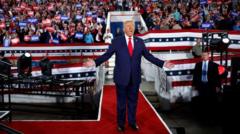The anticipated return of Donald Trump to the White House casts a shadow over future climate change initiatives, sparking concerns among global leaders and scientists about progress towards sustainable energy goals.
Trump's Return Seen as Major Hindrance to Climate Action

Trump's Return Seen as Major Hindrance to Climate Action
Experts Warn of Setbacks in Global Climate Efforts Following Trump's Presidential Win
Trump's ascendancy to the presidency is predicted to significantly curb short-term climate action, complicating efforts just as delegates gather for COP29. Known for his skepticism toward climate initiatives, Trump once derided green energy efforts as a "scam," raising fears that his administration could repeat the consequences of his previous term, which included the withdrawal from the Paris Agreement.
As the United States stands poised for potential withdrawal from the Paris Agreement again—should Trump act promptly post-inauguration—Professor Richard Klein of the Stockholm Environment Institute labeled the current U.S. delegation at COP29 as a "dead duck," unable to negotiate meaningfully. This shift leaves developing nations at a disadvantage, further hampering financial commitments aimed at aiding them in the fight against climate change.
While his administration may aim to revitalize fossil fuel industries via increased drilling and diminished environmental regulations, responses from his base have also sparked discussions about disengaging from the broader UN climate framework, a move that could dramatically weaken global cooperation.
Observations from industry insiders suggest that the Trump administration is likely to adopt staunch pro-fossil fuel policies, including expedited approvals for pipelines, offshore drilling, and fracking on federal lands. In contrast, the question remains if renewable energy growth will persist despite these challenges, given the contradictions within Trump's party regarding investments in green energy.
Despite the gloom surrounding these developments, climate leaders like Christiana Figueres remain hopeful, emphasizing that while Trump's victory presents a significant challenge, it won't halt the momentum toward decarbonization and compliance with the Paris Agreement's objectives.
With global investments in clean technology continuing to outpace traditional fossil fuels, the forthcoming presidency may face pressure to embrace sustainable energy to remain competitive in an evolving market, regardless of its initial inclination to retreat from previous climate commitments.
In summary, Trump's return brings uncertainty, but various actors within the economy and society are determined to pursue the shift towards a more sustainable future, even in the face of political opposition.
As the United States stands poised for potential withdrawal from the Paris Agreement again—should Trump act promptly post-inauguration—Professor Richard Klein of the Stockholm Environment Institute labeled the current U.S. delegation at COP29 as a "dead duck," unable to negotiate meaningfully. This shift leaves developing nations at a disadvantage, further hampering financial commitments aimed at aiding them in the fight against climate change.
While his administration may aim to revitalize fossil fuel industries via increased drilling and diminished environmental regulations, responses from his base have also sparked discussions about disengaging from the broader UN climate framework, a move that could dramatically weaken global cooperation.
Observations from industry insiders suggest that the Trump administration is likely to adopt staunch pro-fossil fuel policies, including expedited approvals for pipelines, offshore drilling, and fracking on federal lands. In contrast, the question remains if renewable energy growth will persist despite these challenges, given the contradictions within Trump's party regarding investments in green energy.
Despite the gloom surrounding these developments, climate leaders like Christiana Figueres remain hopeful, emphasizing that while Trump's victory presents a significant challenge, it won't halt the momentum toward decarbonization and compliance with the Paris Agreement's objectives.
With global investments in clean technology continuing to outpace traditional fossil fuels, the forthcoming presidency may face pressure to embrace sustainable energy to remain competitive in an evolving market, regardless of its initial inclination to retreat from previous climate commitments.
In summary, Trump's return brings uncertainty, but various actors within the economy and society are determined to pursue the shift towards a more sustainable future, even in the face of political opposition.

















